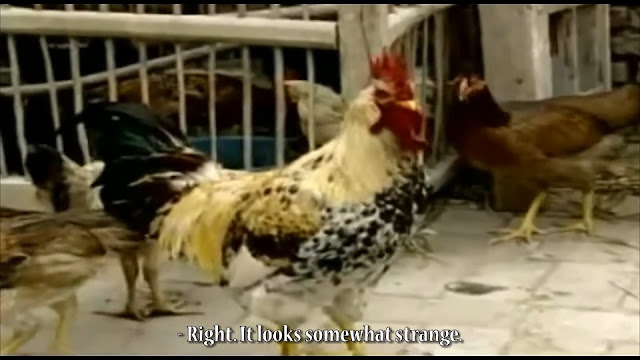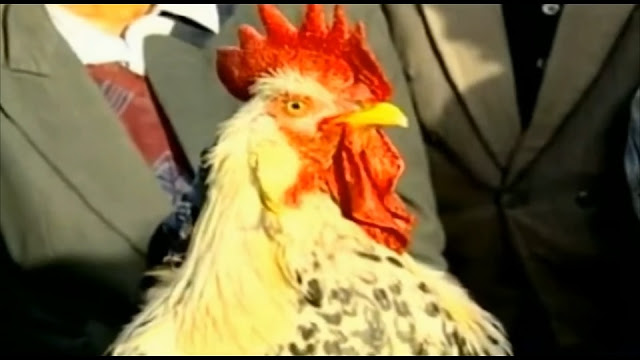Uyghur author Memtimin Hoshur specialised in social tales, predominately seen though a comedic lens. They'd often be framed by a mild-mannered but quirky guy, recounting the stories as if they actually happened. I'd be interested to read someday! Until then, there have been a few low budget movies based on his works, coming out of the East Turkestan region, such as today's, The Speckled Rooster...
Once again, facetious and anonymous local writer Osman visits his publishing 'friend', this time with a story about a speckled rooster. One night the fowl mysteriously seemed to change genders, from a gentle hen to aggressive rooster. What follows is a strange series of events, with theft, criminal misdeeds, and a bit of magic...
I was already interested in Char Horaz (The Speckled Rooster), especially when I learnt it was a sequel to The Crystal Glass. Once I began though I got an odd feeling. The intro seemed oddly downbeat. The lighting was down, the publisher looked older and less happier, Osman's jokes didn't seem to land as well, etc. I was hoping the movie proper would be better, and that's a yes and no, mostly the latter.
The story feels thin and unfocused. For the longest time I was unsure what it was even supposed to be about. It finally finds some direction by the halfway point, but it's still vaguely written. Not enough really happens for my liking, until the last half hour, when it feels like things finally come together. The climax is pretty out there and entertaining By the end I felt the film would've worked a lot better as a 45 minute short film.
There's a smaller
cast here. Osman is predominately the lead, and is alright, though doesn't get as much time to be funny. None of his friends from Qirliq Istakan
appear, which works in a sense, since it allows this to be its own
story, and a more malleable one. On the other hand, they could've
provided some much needed levity and comradeship. His lone friend here is an alright enough guy, with some nice tall tales about the White House.
The rooster naturally doesn't have a character, per se, but his actions are important. He's a real asshole chicken, and ends up meeting a slightly sticky end because of his attitude. Though not without one last trick.
As described by its Youtube introduction, the film is an allegory on the diminished masculinity of Uyghur males during Chinese occupation. What this has to do with hens that turn into roosters is anyone's guess. I figured the message would come together by the end, and it does, in a bit of a loose haphazard way. The majority of the film came off a little unfocused with its themes, and went on weird tangents. When Osman visits an old shaman(?) woman, she tells a story of a landowner's son who magically transformed into a woman, and the events that followed. There are also some entirely irrelevant comments about injections which I couldn't tell were serious, or just meant as a bit of a lark.
The sorta transgender stuff is the most interesting thing about Char Horaz, especially when it comes back in the ending, and intertwines with the central message. It's a pretty funny ending, and certainly a case of poetic justice! It also manages to not be offensive either. That's what surprised me most, seeing how openly and non-judgmentally a subject like this is treated, in what the west would call the less enlightened third world.
Whether or not the message in Char Horaz comes together successfully or not is up for debate. There is one positive I'll give the movie though. While it may have been too vague, I appreciate that it also wasn't really blunt and obnoxious. I have a mental image of an Oscar winning drama where the Chinese do horrible things for 3 hours, and it ends with a man screaming "Do we not have the masculinity anymore to fight this?". Granted it would've been hard doing that at all even if they wanted to, considering the Chinese government would be breathing down their neck, but still, I appreciate the thought.
Perhaps my biggest problem with the film is the animal related content. There are a few fights between chickens (and some rams in one scene), and it got to the point where I felt I was watching a cock fight! To
the film's credit it does use trick photography to accentuate the
confrontations and make them look more intense than they really are, and we never see
anything truly violent. But it's still a bit unpleasant on principle. This is especially apparent by the end, in what is either make-up on the chicken friend, or worse! One of the last shots does also indicate he may have served a culinary purpose too.
Given the film's slight supernatural tone, there are a couple of special effects to match. Not so special, in fact. One is decent, for a pretty brief flash, while one near the end is pretty laughable. Nothing to complain about though considering the place, and nonexistent budget, so I'm happy they even tried.
The music in Char Horaz is pretty uninteresting for the most part. You've got some alright ethnic tunes, but nothing that really jumps out and makes an impression. Late in the game we do finally get a track fitting the bill, and it's quite nifty! Like a Chinese infused modern dance beat. I didn't care for the super sped up version over the credits, but the main one is a fun listen.
Overall, Char Horaz wasn't that fun of an experience to me. It's not a terrible film, nor does any one element ruin it. It's just the effect of many little things, that drag it down till it's just not very engaging or enjoyable.
Information on this subject isn't exactly widely available, at least not out in the open, so it's hard finding out about Uyghur films, namely this series. There is also another film, Sarang. I'm not sure if it's another in this
series, but has the same actor, and is worth mentioning for the music
alone, which is lovely! I haven't yet found it with subtitles, but it'll definitely be on my radar, even if I found Char Horaz to be a disappointment...










No comments:
Post a Comment